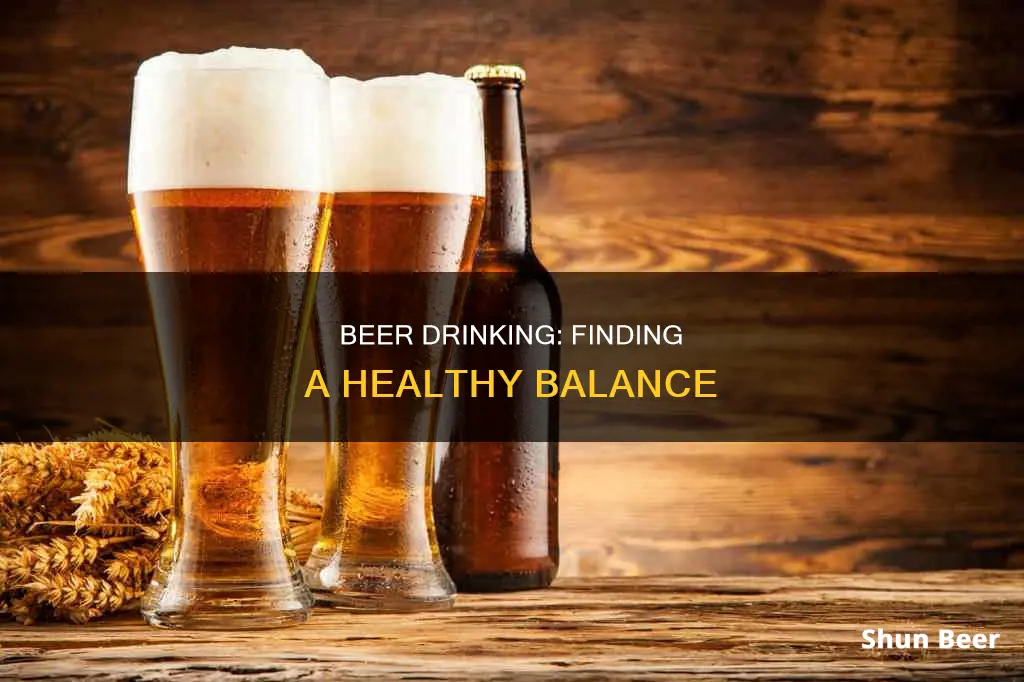
Beer has been consumed by humans for thousands of years, and while it has some health benefits, excessive consumption can lead to adverse health effects. So, what is the healthy amount of beer to drink?
| Characteristics | Values |
|---|---|
| Positive health effects | Decreased risk of heart disease, neurodegenerative diseases, type 2 diabetes, osteoporosis, and dementia |
| Amount for positive health effects | Up to 1 drink per day for women and up to 2 drinks per day for men |
| Negative health effects | Increased risk of cancer, cardiovascular disease, neuropsychiatric diseases, liver disease, weight gain, and depression |
| Amount for negative health effects | More than 1 drink per day for women and more than 2 drinks per day for men |
What You'll Learn

Beer and heart health
Beer is a popular alcoholic drink that has been around for thousands of years. It is made by brewing and fermenting cereal grains with yeast, hops, and other flavouring agents. While beer is often viewed as a drink with little nutritional value, it does contain various nutrients, including vitamins and minerals.
Positive Effects on Heart Health
Drinking light to moderate amounts of beer may have positive effects on heart health. Several studies suggest that drinking one beer a day for women and two beers a day for men may be associated with a lower risk of heart disease. A 12-week study in 36 overweight adults found that moderate beer intake improved the antioxidant properties of HDL ("good") cholesterol while also improving the body's ability to remove cholesterol. A large review stated that low to moderate beer intake could lower heart disease risk to a similar extent as wine.
Negative Effects on Heart Health
On the other hand, heavy alcohol consumption can increase the risk of heart disease and stroke. Binge drinking, defined as four or more drinks for women and five or more drinks for men in about two hours, can cause irregular heart rhythms called arrhythmias. Additionally, regular or high alcohol use can lead to diseases of the heart muscle, called cardiomyopathy, and can raise blood pressure.
Recommendations
To reduce the risk of negative health consequences, it is recommended to limit beer intake to no more than one standard drink per day for women and two for men. Heavy and binge drinking have been linked to an increased risk of early death, alcohol dependence, depression, liver disease, weight gain, and cancers. While beer may have some health benefits, it is important to note that these benefits can also be achieved through a varied, nutrient-rich diet of whole foods like fruits and vegetables and regular exercise.
Beer vs Water: Which is Healthier?
You may want to see also

Beer and diabetes
Beer is a popular alcoholic beverage that has been consumed for thousands of years. It is produced by brewing and fermenting cereal grains with yeast, hops, and flavouring agents. While beer is often viewed as nutritionally deficient, it does contain some vitamins and minerals. Beer also contains calories and carbohydrates, which can impact blood sugar levels. Therefore, individuals with diabetes must be aware of how beer can affect their health.
Beer's Impact on Blood Sugar
Beer can impact blood sugar levels due to its carbohydrate content. The liver, which is responsible for storing and releasing glucose, also clears alcohol from the body. As a result, drinking alcohol can slow down carbohydrate metabolism, potentially leading to low blood sugar (hypoglycemia). This effect is particularly important for people with diabetes, as they already have trouble regulating blood sugar levels. Additionally, alcohol can interfere with the effectiveness of oral diabetes medications or insulin, further affecting blood sugar control.
Recommendations for People with Diabetes
People with diabetes do not need to completely abstain from alcohol or beer. However, it is essential to drink in moderation and follow specific guidelines:
- Limit consumption to no more than one drink per day for women and no more than two drinks per day for men.
- Drink beer with food to prevent hypoglycemia.
- Choose "light" beers, which are lower in carbohydrates, calories, and alcohol content.
- Avoid sugary mixed drinks, sweet wines, or cordials.
- Stay hydrated by drinking water along with beer.
- Monitor blood sugar levels regularly, especially while drinking and up to 24 hours after consuming alcohol.
- Consult a doctor or healthcare provider for personalised advice, especially if taking medications for diabetes or other health conditions.
Health Risks of Excessive Drinking
Excessive alcohol consumption, including beer, can lead to negative health consequences for anyone, but especially for people with diabetes:
- Increased risk of chronic diseases such as heart disease, liver disease, and kidney disease.
- Weight gain due to excess calories.
- Interference with diabetes medications or insulin, affecting blood sugar control.
- Increased blood pressure and triglyceride levels.
- Increased risk of depression and alcohol dependence.
- Higher likelihood of engaging in risky behaviours.
Benefits of Light to Moderate Beer Consumption
Light to moderate beer consumption (up to one drink per day for women and up to two drinks per day for men) may provide some health benefits:
- Reduced risk of heart disease and improved "good" cholesterol levels.
- Improved blood sugar control, lowering the risk of developing type 2 diabetes.
- Stronger bones and reduced risk of osteoporosis.
- Lower risk of neurodegenerative diseases, including Alzheimer's disease and dementia.
Individuals with diabetes can usually drink beer safely, but it is essential to do so in moderation and follow specific guidelines. Excessive beer consumption can lead to negative health consequences and interfere with diabetes management. Light to moderate beer intake may offer some health benefits, but these can also be achieved through a varied, nutrient-rich diet of whole foods like fruits and vegetables.
Beer Bread: Healthy or Harmful?
You may want to see also

Beer and osteoporosis
While excessive alcohol consumption is a significant risk factor for osteoporosis, moderate beer drinking may have beneficial effects on bone health.
Osteoporosis is a degenerative disease that causes bones to weaken and thin, increasing the risk of fractures. Alcohol can influence bone density, the speed of bone cell regeneration, and nutrient absorption.
Some studies suggest that moderate alcohol consumption may have a positive impact on bone health. For example, a 2008 study found that people who consumed about one alcoholic drink a day had a lower risk of hip fractures. However, more recent research challenges this idea, indicating a positive relationship between alcohol consumption and osteoporosis.
When it comes to beer specifically, some studies suggest that moderate intake may be beneficial for bone health. A study of 1,697 healthy women found that beer intake was associated with a significant increase in the speed of sound transmission, suggesting a potential link to increased bone density. Another study of 1,182 men and 1,537 women found that moderate beer drinking (1-2 beers per day) was associated with increased bone density in both men and women.
The potential benefits of moderate beer consumption on bone health are attributed to several factors:
- Silicon content: Beer is a good source of dietary silicon, which is key for bone health. The brewing process extracts silicon from hops and grain husks, and this silicon is easily absorbed by the body. Pale-colored malts tend to have higher silicon content than darker beers.
- Phytoestrogens: Beer contains phytoestrogens, particularly lignans, which may positively impact bone metabolism and mass.
- Polyphenols: The polyphenols in beer, especially resveratrol, may have a positive effect on bone health.
- Estrogen levels: Beer slightly increases estrogen levels in men, which can contribute to bone mineral density.
However, it is important to note that excessive alcohol consumption, including beer, is associated with negative health outcomes, including an increased risk of osteoporosis. Therefore, moderation is key, and it is always advisable to consult with a healthcare professional for personalized recommendations regarding alcohol consumption.
Homebrew Beer: Healthier Choice or Marketing Myth?
You may want to see also

Beer and cancer
Beer may have certain health benefits, such as reducing the risk of heart disease, improving blood sugar control, and decreasing the risk of osteoporosis. However, excessive consumption can lead to negative health consequences, including an increased risk of specific cancers.
According to the National Institute on Alcohol Abuse and Alcoholism, a standard alcoholic drink in the United States contains 14 grams of pure alcohol. This amount of alcohol is typically found in 12 ounces of regular beer. Heavy drinking is defined as consuming four or more drinks on any day or eight or more drinks per week for women, and five or more drinks on any day or 15 or more drinks per week for men.
There is a strong scientific consensus that alcohol consumption, including beer, can cause several types of cancer. The evidence indicates that the more alcohol a person regularly consumes over time, the higher their risk of developing an alcohol-associated cancer. Even those who have no more than one drink per day and binge drinkers have a slightly increased risk of certain cancers.
Clear patterns have emerged between alcohol consumption and the development of the following types of cancer:
- Head and neck cancer: Moderate to heavy drinking is associated with higher risks of oral cavity, pharynx (throat), and larynx (voice box) cancers.
- Esophageal cancer: Any level of alcohol consumption is associated with an increased risk of esophageal squamous cell carcinoma, with risks ranging from 1.3 times higher for light drinking to nearly five times higher for heavy drinking.
- Liver cancer: Heavy alcohol consumption is linked to approximately twice the risk of two types of liver cancer: hepatocellular carcinoma and intrahepatic cholangiocarcinoma.
- Breast cancer: Epidemiological studies show an increased risk of breast cancer with higher alcohol intake. Light drinkers have a slightly increased risk, while moderate and heavy drinkers have 1.23 and 1.6 times the risk, respectively.
- Colorectal cancer: Moderate to heavy alcohol consumption is associated with 1.2 to 1.5 times the risk of cancers of the colon and rectum compared to non-drinkers.
While some studies suggest that light to moderate beer consumption may have potential health benefits, excessive drinking can lead to negative health consequences, including an increased risk of specific types of cancers. It is essential to drink in moderation and not exceed the recommended guidelines for alcohol consumption to minimize the risk of cancer and other adverse health effects.
Draught Beer: Healthy Beverage or Just a Fad?
You may want to see also

Beer and liver disease
Beer has been consumed for thousands of years and is enjoyed by people all over the world. However, while drinking beer in light to moderate amounts may have some health benefits, excessive consumption can lead to serious health issues, including liver disease.
Alcohol-induced Liver Disease
Liver disease is common but preventable. It is caused by the heavy use of alcohol, which is the liver's job to break down. If you drink more than your liver can process, it can become badly damaged. Alcohol causes fat to accumulate in the liver, which can lead to inflammation, cirrhosis, fatty liver disease, and liver cancer.
Types of Alcohol-induced Liver Disease
There are three types of alcohol-induced liver disease:
- Steatotic (fatty) liver: This is the most common alcohol-induced liver problem and is caused by a build-up of fat inside liver cells, leading to an enlarged liver.
- Acute hepatitis: Alcohol-associated hepatitis is an acute inflammation of the liver, resulting in liver cell death and permanent scarring.
- Cirrhosis: Alcohol-associated cirrhosis is the destruction of normal liver tissue, leaving scar tissue in its place.
Symptoms of Alcohol-induced Liver Disease
The early stages of alcohol-related liver disease often have no symptoms, but when they are present, they may include:
- Pain or discomfort in the upper right side of the abdomen
- Fatigue
- Unexplained weight loss
- Abdominal pain
- Yellowing of the skin and eyes (jaundice)
- Bleeding in the gastrointestinal tract
- Fluid build-up in the abdomen
- Increased infections
Treatment of Alcohol-induced Liver Disease
The aim of treatment is to restore normal function to the liver. This involves stopping alcohol consumption and participating in an alcohol use disorder treatment program. In some cases, a liver transplant may be necessary.
Clarified Beer: Healthier Option or Just a Fad?
You may want to see also
Frequently asked questions
Drinking one or two standard beers per day may have positive effects on your heart, bones, blood sugars, and dementia risk. Beer may also decrease the risk of heart disease, neurodegenerative diseases, and type 2 diabetes.
Drinking more than two beers per day can lead to health issues such as depression, weight gain, liver disease, cancer, cardiovascular disease, and neuropsychiatric diseases. Heavy drinking can also increase the risk of death and alcohol dependence.
Moderate beer consumption is defined as one beer per day for women and up to two beers per day for men. It's important to note that daily consumption isn't recommended for everyone, especially those with certain medical conditions or those taking medications that interact with alcohol.
Beers with lower alcohol content and less added sugars are generally considered healthier choices. Light beers tend to have fewer calories and alcohol content, reducing potential negative health impacts. Craft beers with natural brewing processes and higher levels of polyphenols may also offer slight health benefits.







